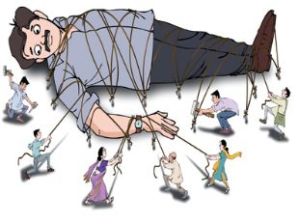 In March 2009, the parents of IIT Delhi alumnus Deepinder Goyal, 29, were perplexed to see their son working from home. After a few days, they began to worry. Their “worst fears” were confirmed when Goyal disclosed that he had quit his cushy job at consulting firm Bain & Co to set up a foodie website—Foodiebay.com. His parents were worried and advised Goyal to return to a “job.” But the company he founded, now called Zomato.com, received $2.3 million (about Rs 12.3 crore) in funding in 2011, broke even with estimated revenue of more than Rs 3.5 crore in 2012, and has even expanded to west Asia and Europe. “They are extremely happy and proud now,” says Goyal.
In March 2009, the parents of IIT Delhi alumnus Deepinder Goyal, 29, were perplexed to see their son working from home. After a few days, they began to worry. Their “worst fears” were confirmed when Goyal disclosed that he had quit his cushy job at consulting firm Bain & Co to set up a foodie website—Foodiebay.com. His parents were worried and advised Goyal to return to a “job.” But the company he founded, now called Zomato.com, received $2.3 million (about Rs 12.3 crore) in funding in 2011, broke even with estimated revenue of more than Rs 3.5 crore in 2012, and has even expanded to west Asia and Europe. “They are extremely happy and proud now,” says Goyal.
Like Goyal, almost every aspiring businessman finds the leap to entrepreneurship brings with it difficulties that are not just economic. The fear of rebuke or rejection from family and friends is in most cases their first challenge. “Resistance from families to risk is one of the three biggest inhibitors to entrepreneurship in India, the other two being capital and awareness,” says Sanjay Anandaram, a venture partner with Seedfund and an active mentor to young entrepreneurs.
When IIT Roorkee alumnus and founder of proper ty portal CommonFloor.com Sumit Jain, 28, wanted to launch his own venture in the third year of his engineering course, his father, who owned a hardware business in Meerut, vehemently opposed the idea. “I was restrained by the family, which called me ‘confused’ and told me to study,” says Jain.
Such resistance stems from deep-rooted cultural mores, according to sociologist MD Usha Devi, a professor at the Institute for Social and Economic Change in Bangalore. “We suffer from a dependency syndrome in India, of working for someone than creating jobs. Even the students in colleges are taught to become employees and never employers,” she says.
Although thwarted by family on his first attempt, Jain, who worked at Oracle for a year after graduating, quit his job to chase his dream. He rented office space in Bangalore and cofounded a realty portal, CommonFloor.com with two friends. In five years the company has grown from three employees to 250, has won funding from Accel India and Tiger Global, and is aiming for revenue of $25 million in 2014.
It is the promise of such growth that is encouraging entrepreneurs to push back. Ankur Singla, a graduate from one of India’s leading law schools did not tell his parents that he had quit a prestigious job at a London law firm to explore a startup idea. Once he had a plan in place he returned home to set up Akosha, an online forum for consumer redressal that now works with over 300 companies and has resolved 1.3 lakh complaints.
But for every Singla or Jain who break out of the mould there are many who fail to make the leap. “Children who have nothing to fall back upon often prefer secure jobs,” says Isec’s Usha Devi. Not only at home, entrepreneurs are black-listed in the marriage market too, where they are mostly regarded as ‘unstable.’
“Entrepreneurs who wish to get married are told to go get a job,” says Delhibased Ajay Pal Singh, 26, who quit a job at STMicroelectronics to start HealthAssist.in, a provider of wellness plans to large companies. For the past few months, Singh has been trying to instill faith in his fiancee’s father about his business model. His company recently won funding of about $40,000 (Rs 22 lakh) from the government of Chile’s startup programme. “Things are better in the family after the funding,” says Singh, who is still unmarried.
Nice Article Pradeep. We need to change our attitude towards startups in India. It’s time when people should follow entrepreneurship rather than getting a management degree and serve other people !!
Well said Mukul 🙂